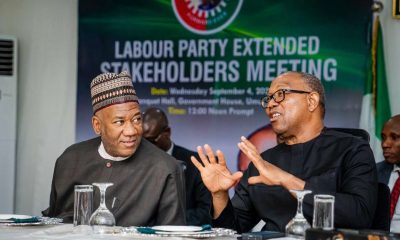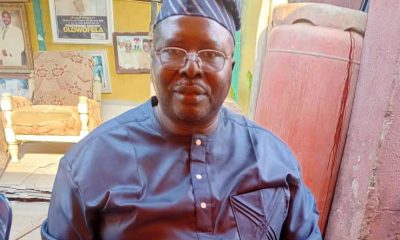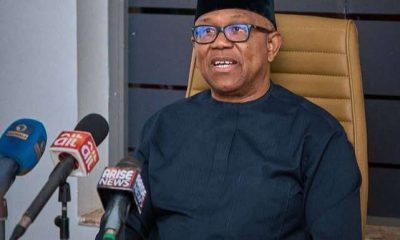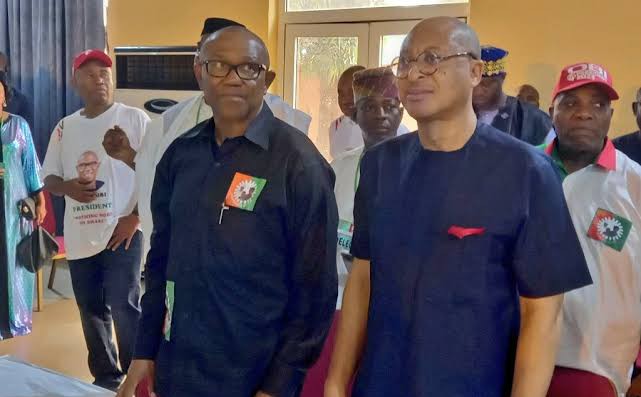Headlines
Igbophobia in Lagos a Dangerous Politics to Peace, Economy
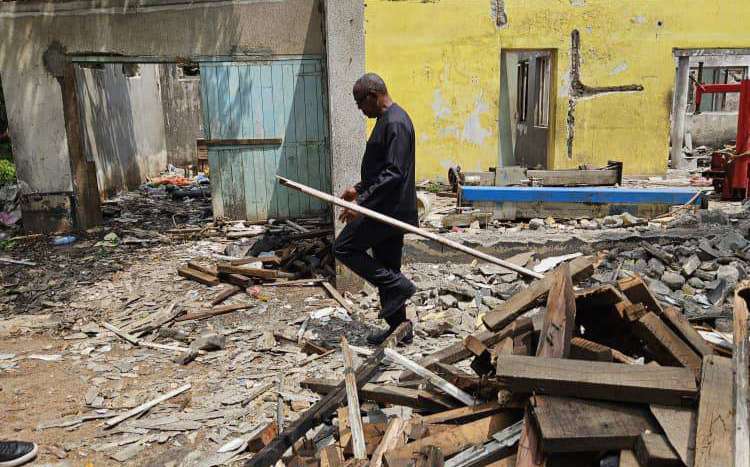
As the tempo of the 2027 general election gathers momentum across the country, the current events in Lagos State, which are raising the specter of Igbophobia, have become a sore reflection of what to expect and a sad reminder of the 2023 elections that revealed the ugly underbelly of our ethnic relations in a fragmented and caustic political atmosphere.
For a nation grappling with myriad challenges, the rising tension in Lagos between the Igbo and the government and its supporters is a needless problem that may have no winners – only losers, both for the state and Nigeria. Although both sides claim to be acting within the law, ultimately only one may be right. Yet, being right may still not solve the problem.
Lagos has long prided itself as a welcoming home for all and has thrived economically on this basis, making it the sixth-richest economy in Africa and the envy of other countries and states.
Business and politics hardly mix well, which is why most serious and development-conscious nations try to separate them as much as possible, knowing that politics can undermine and even destroy business. Nigeria is a clear example of this, as its economy has suffered severely due to political instability and policy inconsistency.
But since the 2023 elections – in which President Bola Tinubu, as candidate of the All Progressives Congress (APC), lost the state in the presidential poll to Labour Party candidate Mr. Peter Obi – all hell has been let loose. The state has suddenly become hostile to its most vibrant economic constituency: the Igbo.
The Yoruba are regarded as one of the most educated and enlightened groups in Nigeria, but the events of 2023 exposed the worst of their politics and pretensions about their belief in democracy – which is nothing without the right to free choice.
Pyrrhic Victory
Tinubu’s defeat by Obi in Lagos proved to be the turning point, escalating ethnic hate rhetoric and persecution of the Igbo to levels previously unimaginable and bringing out, as Fela Kuti once sang, “the beast in us.” This has turned the once “free” Lagos into a place of fear and political brigandage.
A series of anti-Igbo actions followed the March 2, 2023 election – disenfranchising Igbo voters during the governorship poll by deploying hoodlums to chase them away from polling booths, destroying Igbo-dominated markets, and demolishing their houses.
However, all past acts of hostility pale into insignificance compared to the inhuman and destructive demolition of structures at the Trade Fair Complex by the government. Whether the buildings were wrongly constructed is immaterial, they did not spring up overnight. The government has provided various reasons for the demolition, none of which justified the action.
First, it claimed the buildings were on flood channels, but this was not proven or demonstrated, since the structures were not removed to allow for flood flow. It later alleged that the buildings lacked legal approvals, which also contradicts existing laws and practices. The land in question belongs to the federal government, and only its agencies are responsible for approvals and certifications. This has left many people perplexed about the ulterior motive behind the demolition, which caused national embarrassment and outrage for its sheer scale of destruction.
Igbo Connections
Undoubtedly, Obi’s victory angered power brokers in Lagos and sent a strong signal that if they failed to act fast, Lagos could slip from their grip. The state election, in which Governor Babajide Sanwo-Olu sought reelection, could have gone to Labour Party’s candidate, Gbadebo Rhodes-Vivour, who ironically has Igbo heritage, his mother being Igbo and his father a Lagosian.
Immediately after the presidential election, a campaign of intimidation and threats was unleashed against the Igbo, including a viral video clip of the Lagos street strongman, MC Oluomo, then chairman of NURTW, declaring that any Igbo who came out to vote would be dealt with.
This led to low voter turnout in Igbo strongholds such as Oshodi, Isolo, Ojo, Eti-Osa, and other areas.
Although the APC eventually won the 2023 governorship election, the actions taken immediately after, and which are still ongoing, have been described as vindictive and politically motivated. Despite retaining control of Lagos, the threat and marginalisation of the Igbo have worsened as the state heads toward 2027.
With this mindset, Igbo business premises have been targeted, while some landlords have reportedly begun discriminating against Igbo tenants and refusing them accommodation.
What gave away the state government under Sanwo-Olu as allegedly punishing the Igbo for 2023 was the renaming of streets bearing Igbo names in several local government areas. In Ajeromi-Ifelodun, for instance, about 24 streets with Igbo names were changed. The move also affected Bariga, where the popular Charly Boy Bus Stop was renamed after rapper Olamide Badoo.
Anti-Igbo Policies
It would be recalled that anti-Igbo sentiments had been building up since 2015. Although the Yoruba were not on the ticket then, the strong Igbo vote in Lagos was evident, a warning shot.
The Oba of Lagos, Rilwan Akiolu, had warned the Igbo ahead of the 2015 election that if they voted for the Peoples Democratic Party (PDP) against the APC, they risked being drowned in the lagoon.
This tension resurfaced in 2020, and with Tinubu’s 2023 ambition, the Igbo were perceived as a political threat. The Lagos State House of Assembly in 2020 first mooted the idea of reviewing colonial-era street and place names, ostensibly to remove colonial vestiges but in reality, critics said, to target Igbo names, which are the most visible after Yoruba ones.
The House later urged Governor Sanwo-Olu to remove “all vestiges of colonialism and slave trade” from public places and infrastructure. Although the proposal was condemned and shelved, it resurfaced after the 2023 election under Speaker Mudashiru Obasa, who was re-elected.
In his first motion, he proposed the Property and Business Law to “protect indigenes of Lagos State from exploitation by outsiders,” asserting that Lagos is Yoruba land, a veiled reference to the Igbo.
He declared that part of the legislative agenda was to ensure that all laws passed by the House would be translated into Yoruba to “protect the interests of our people.”
Action and Reaction
The campaign soon began that Lagosians should reclaim their land allegedly sold to the Igbo.
It would be recalled that the late educationist and former Minister of Education, Professor Babatunde Fafunwa, once warned Lagos families against selling their ancestral properties, especially to the Igbo, out of greed, cautioning that their heritage would be lost.
Although local governments have denied that their actions were politically motivated, prominent Nigerians have disagreed.
Senior Advocate of Nigeria (SAN) Ebun Adegboruwa described the anti-Igbo sentiment as “a violation of human dignity,” calling the measures “emotional and unconstitutional.”
Similarly, Femi Falana (SAN) condemned the renaming of streets and landmarks without public consultation, describing it as “a violation of constitutional provisions and a display of authoritarianism.”
He argued that local governments have exclusive powers over street naming and should hold public hearings before renaming any infrastructure.
Former Minister of Communications, Maj. Gen. Tajudeen Olanrewaju (rtd), also criticised the move, warning that changing historically significant names amounted to “inconceivable injustice” and disregard for Lagos’s cultural identity.
“These politicians are obliterating the landmark history of our communities. They should revert to the old street names,” he said.
The Vice Chairman of the Joint Action Front, Achike Chude, faulted the lack of transparency in the renaming process, while Senator Babafemi Ojudu cautioned that Lagos was “playing with fire.”
He warned that the state’s anti-Igbo actions were “politically motivated and ethnically charged,” adding that they could trigger serious tensions between the Yoruba and Igbo communities.
However, Ohanaeze Ndigbo Lagos State President, Mr. Solomon Ogbonna Aguene, described the renaming of Igbo-linked streets as “envy-driven” and “counterproductive.”
He said: “If someone sees a place as home, invests to develop it, and earns the recognition of having a street named after him or his people, why should that be a problem? It’s just envy and nothing more.”



